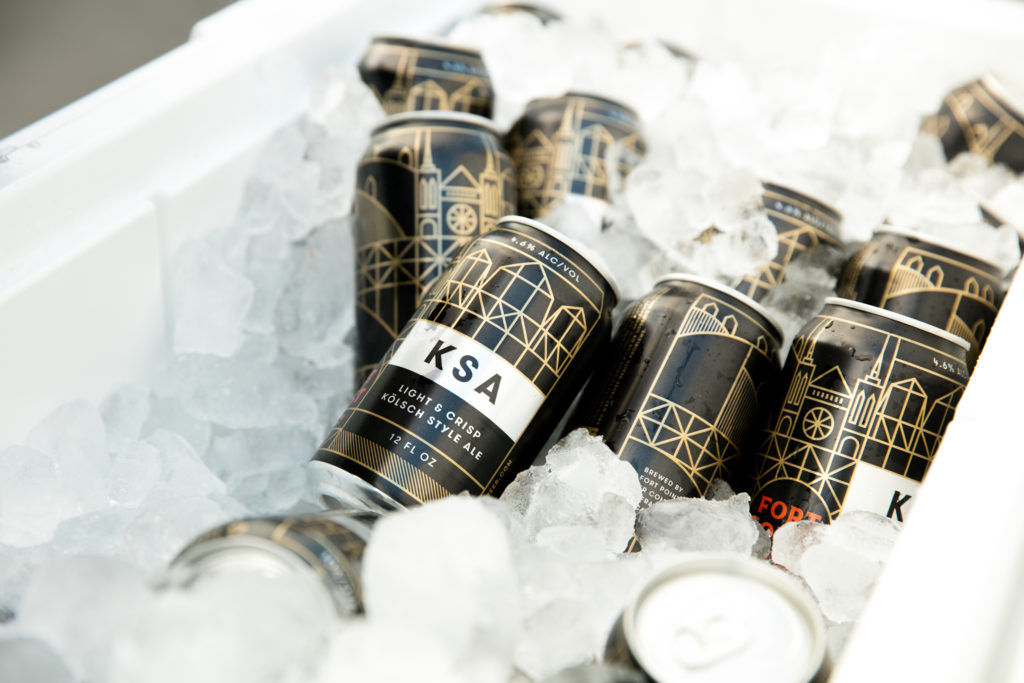
Oktoberfest Beers: Why You Should Be Drinking Kölsch Styles Made in the West
You can technically only get authentic Kölsch in Germany. But West Coast makers are brewing up inspired versions.

Sarah Chorey
The annual Oktoberfest in Munich is canceled. Summer is coming to a close. All the more reason to drag out these last few dog days with German-style beers. And we’re not just talking about boots full of festival-inspired Märzen. Enter: Kölsch.
Myriad Western brewmasters are making refreshing and delicious craft versions inspired by the pale, gold-colored style, which is essentially “an ale that drinks like a lager,” says Becca Gray, co-owner of Island Hoppin’ Brewery on Orcas Island just off the Washington state coast.
If you often opt for a Hefeweizen or a hazy IPA, Kölsch might be the end-of-summer sip for you. While West Coast makers can’t technically call them authentic Kölsch—that can only be brewed in Cologne, Germany—you can find cans and bottles made here in the West that pay homage to its easy drinking heritage.

Molly De Coudreaux
San Francisco’s Fort Point Beer Co., for example, makes a Kölsch-style ale called KSA that “breaks a lot of the traditional rules for Kölsch brewing, but the finished beer is true to the spirit of the style,” says Mike Schnebeck, director of innovation. Here’s why: Kölsch is typically fermented at cooler temperatures—think high 50s to low 60s, Schnebeck says—before enduring even colder temps during a lagering period. “The cooler temperature used in Kölsch brewing helps subdue some of the fruitier notes typically found in other styles of ale,” Schnebeck adds.
So, while Fort Point uses fairly typical malts, “when combined with our ale yeast strain and fermented in the mid-60s, these ingredients create a beer that is full-bodied yet crisp and refreshing, with light notes of fresh bread dough and orange blossom honey,” Schnebeck says.
“When we first opened, we had no idea that an unassuming Kölsch style ale would become our best-selling beer,” Schnebeck adds. “If you’re curious about the style, I think KSA is a great place to start!”
Another super approachable can is Mammoth Brewing Co.’s Golden Trout Kölsch. Named after California’s state fish, this light and drinkable style is a no-brainer to toss into your hiking backpack, or throw into your cooler for the beach. The Mammoth Lakes company, which has been making beer since 1995, boasts a quaint outdoor beer garden where you can enjoy alpine food and sips under the stars, or get growlers to go.

Will Fisher
Up in Washington, Gray and brewer Nate Schons crafted their K-Pod Kölsch like a light beer but without extended lagering. “The quicker conditioning allows us to keep it flowing even during our busy summer months,” says Gray, whose tasting room is nestled in downtown Eastsound on Orcas Island. “It’s the perfect beer this time of year as it’s been hard to keep up with the demand.”
Named after the endangered orcas that are decreasingly found around the Puget Sound, the lager is tropical in flavor and easy to drink. Due to the couple’s “utmost respect and reverence” for the animals, “it only seemed right to name a beer after them,” Gray says.
This is the first year that Island Hoppin’ is offering the style in cans, though the owners have been brewing it for nearly a decade. They currently distribute in the northern Puget Sound but “hope to distribute further with the cans,” Gray says.
And if you’re looking to dive even deeper into Kölsch styles, Fort Point Beer Co. also offers limited-edition cans of Yuzu KSA Radler—and no, that’s not a sour beer.

Sarah Chorey
“We love the drinkability of KSA, but wanted to see if we could take it one step further with the addition of citrus,” Schnebeck says. “Yuzu is really well-suited for beer because of its unique breadth of piney, citrusy flavor that complements beer in the same way a lot of hop varieties do.”
The company named the can after a traditional German beer cocktail, the Radler, which typically pairs lager with citrus such as sparkling lemonade. The result? “A thirst-quenching, zippy citrus kick,” Schnebeck says.
This Came from the 2021 Waters of the West Issue—Read It Here!
Get one year of Sunset—and all kinds of bonuses—for just $24.95. Subscribe now!
